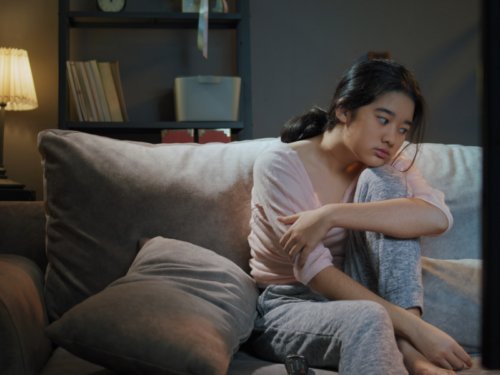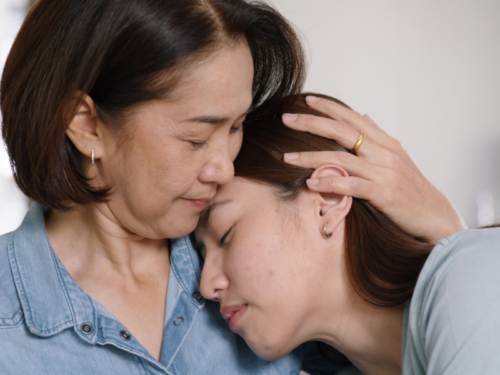
Table of Contents
Are Your Violent Thoughts Harm OCD?

Written By: Dr. Rasna Kaur Neelam

Clinically Reviewed By: Dr. Don Gasparini
January 3, 2024
4 min.
It’s pretty common to have the occasional intrusive, violent thought, but if the thoughts are hard to shake and cause anxiety and compulsive behaviors, it may be harm OCD.
Learn more about our Clinical Review Process
Table of Contents
It’s a little-discussed fact that many people have the occasional intrusive thought about violence. While driving, for example, you may wonder what would happen if you suddenly veered off the road. Or, while at work, you may imagine what would happen if you started a physical fight with a co-worker.
For most people, these intrusive, violent thoughts are fleeting and easy to dismiss. However, for some with obsessive-compulsive disorder (OCD), the distressing thoughts or mental images of harm are recurrent and hard to shake, leading to anxiety and compulsive behaviors to prevent perceived harm. This pattern of behavior is known as “harm OCD.” Below, we delve into examples of harm OCD thoughts and explore how harm OCD therapy can help manage the condition.

We treat obsessive-compulsive disorder
Intensive, virtual care for OCD is one step away.
What is harm OCD?
Harm OCD is an informal term commonly used to describe a specific subtype of OCD. It’s not an independent mental health diagnosis, but someone may be diagnosed with OCD “with aggressive obsessions” or “with harm-related compulsions” in a clinical setting.
Like any kind of OCD, harm OCD includes two components: obsessions and compulsions. The obsessions are unwanted violent thoughts that cause anxiety and distress. This could include recurrent thoughts related to suicide, stabbing, sexual assault, and more. Although people with harm OCD know that these intrusive thoughts aren’t founded in logic, they still find the thought extremely difficult to ignore or suppress.
As a result of these obsessions, people with harm OCD will often participate in rituals called compulsions, which are attempts to neutralize or prevent intrusive thoughts. For example, an individual may repeat the word “ok” for 30 minutes before using kitchen utensils to prevent harm from knife usage. Another person may count to 1,000 each morning and evening to avoid hitting a pedestrian with their car. As exemplified by these scenarios, the compulsions are not logically related to the obsessions, can take up a lot of time, and can cause significant distress to the individual performing them.

Signs and symptoms of harm OCD
If you think you or a loved one may have harm OCD, it’s important to know the signs and symptoms. Here are some common signs and symptoms of harm OCD:
- Distressing and unwanted thoughts of committing acts of violence
- Worrying about carrying out these violent actions, even if there is no actual risk
- Feeling guilt, shame, or self-doubt due to the nature of the intrusive thoughts
- Compulsive behaviors meant to alleviate anxiety or prevent possible harm
- Seeking reassurance that harm won’t happen
- Avoiding situations, people, or objects associated with potential harm, even if there is no actual risk

Harm OCD treatment
OCD, including harm OCD, is often underdiagnosed and untreated, possibly due to the taboo nature of violent thoughts in the case of harm OCD. However, with proper support, healing is possible. And, getting treatment for any type of OCD is important since, without treatment, the condition (or commonly co-occurring diagnoses like generalized anxiety disorder and depression) can worsen over time. Here are some treatment options available for harm OCD.
Mindfulness-based cognitive therapy (MBCT)
MBCT is a modified form of cognitive behavioral therapy (CBT) that incorporates mindfulness, breathing exercises, meditation, and a focus on the present. The goal is to replace feelings of anxiety or fear (that would normally trigger compulsions) with feelings of calm and openness. In the case of harm OCD, this can help people break the cycle of violent obsessions and subsequent compulsions.
Exposure and response prevention (ERP)
ERP therapy is a type of exposure therapy that slowly introduces people to a trigger that would normally cause fear or anxiety. By working with a trained professional in a safe environment, people start to develop healthy coping skills related to their intrusive thoughts.
Take, for example, a person with harm OCD who has an intrusive, unwanted thought about harming a loved one. In ERP therapy, a therapist would guide the person to vividly imagine scenarios where they are close to the loved one without taking any safety precautions or seeking reassurance about the loved one’s safety. The person learns, through repeated sessions, that their feared harm doesn’t happen, reducing anxiety and the need for compulsive behaviors. This helps them gain control over their fears.

Medication
Medication is commonly used in the treatment of OCD. In fact, a recent study of pediatric OCD in people ages 7 to 17 found that a combination of medication and therapy is more effective in treating OCD than medication or therapy alone. The medication used in the study, Sertraline, is part of a class of medications called selective serotonin reuptake inhibitors (SSRI). In addition to OCD, SSRIs are FDA-approved to treat depression, generalized anxiety disorder, bipolar disorder, panic disorder, and more. It’s important to speak with a psychiatrist or medical professional familiar with the risks and benefits of medication before beginning treatment.
Get help for harm OCD at Charlie Health
If managing unwanted violent thoughts and harm OCD symptoms is impacting your mental health, Charlie Health is here to help. Charlie Health’s virtual Intensive Outpatient Program (IOP) provides more than once-weekly mental health treatment for young people dealing with complex mental health conditions, including OCD. Our expert clinicians incorporate evidence-based therapies into individual counseling, family therapy, and group sessions. With treatment, managing harm OCD symptoms is possible. Fill out the form below or give us a call to start healing today.




